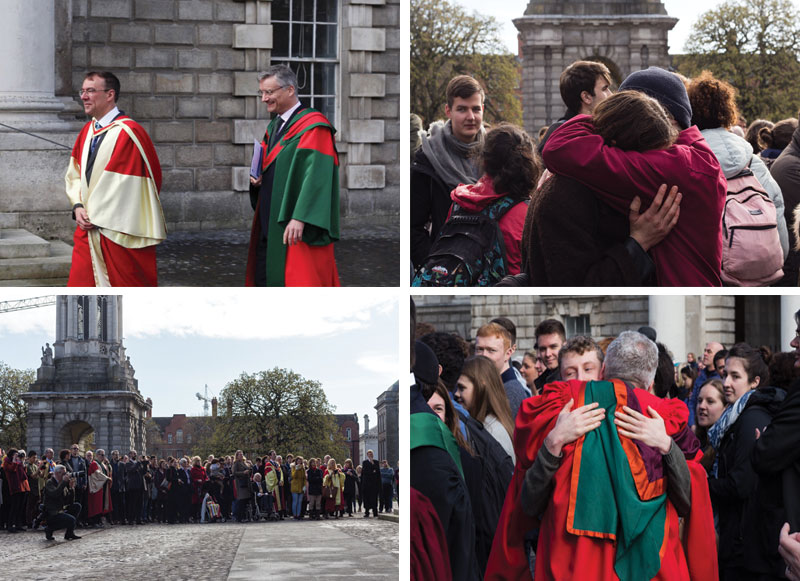Today, the election of 73 Scholars, 16 Fellows, two Professorial Fellows and two Honorary Fellows was announced on the steps of the Public Theatre, as part of one of Trinity’s longest-standing traditions.
Provost Patrick Prendergast made the announcement as part of the annual Trinity Monday tradition. “We are so proud of all our students and academics today that have become new Fellows and Scholars. This is always a special day for all of us where we celebrate their hard work and academic prowess”, he said in a press statement.
Internationally renowned Irish poet Michael Longley was awarded an Honorary Fellowship today. Longley, who was born in Belfast, is a Trinity graduate who made his name as part of a clutch of poets to emerge from Northern Ireland during the Troubles.
Prof Brian Lawlor was also named as an Honorary Fellow. Lawlor, who is recognised for his work on ageing and dementia, is the Conolly Norman Professor of Old Age Psychiatry at Trinity and is a consultant psychiatrist at St James’s Hospital.
Trinity refers to election to scholarship as “the most prestigious undergraduate award in the country”.
With over 70 Scholars elected, today bucked a trend that has seen the number of Scholars elected decline somewhat in recent years. Only 55 Scholars were elected in 2017, compared to 99 in 2014.
To be eligible for scholarship in most cases, a second-year undergraduate student must achieve an overall mark of 70 per cent or higher in a set of optional “searching” examinations held in January, with the majority of their papers also receiving a mark of 70 per cent or higher. The student must receive a mark of 65 per cent or higher in the remaining papers.
Aside from the work required over Christmas, the scholarship examinations are perhaps best known for the perks that students receive for being successful in the examinations – Scholars are granted accommodation on campus or in Trinity Hall free of charge, have their tuition fees paid for and can attend Commons every day for free.
Fellowship is awarded to those who can prove “scholarship or research achievement of a high order” coupled with “evidence of the candidate’s contribution to the academic life of the College”, including effective teaching.
Prof Eleanor Denny, from the School of Social Sciences & Philosophy; Prof Sarah McCormack from the School of Engineering; Prof Ruth Britto from School of Mathematics and Prof Ruth Barton from the School of Creative Arts were all elected to Fellowship. Other Fellows included Prof Adrian Bracken from the School of Genetics and Microbiology; Prof Giuliana Adamo from School of Language, Literature & Cultural Studies; Prof Ben Wold from the School of Religions, Peace Studies & Theology; Prof Desmond Ryan from the School of Law and Prof David Finlay School of Biochemistry & Immunology.
Prof Norah Campbell, of the School of Business; Prof Tristan McLoughlin, of the School of Mathematics, and Prof David Shepherd of the School of Religions, Peace Studies & Theology were also made Fellows, alongside Prof Marco Ruffini of the School of Computer Science & Statistics and Prof Matthew Campbell of the School of Genetics & Microbiology.
Scholarship and Fellowship have been some of the most enduring aspects of Trinity life. When Trinity was founded in 1592, the Foundation Charter cited the Body Corporate as consisting of the Provost, the Fellows and the Scholars.
Today, Trinity Monday, marks the first day of Trinity Week – the first day of Trinity Term. The week offers a range of events open to the College community and to the public. This year’s events are based on the theme of “Energy” and are organised by the Faculty of Engineering, Mathematics and Science.







